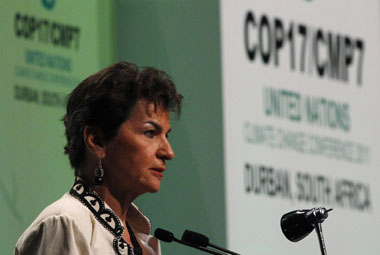By Hardev S. Sanotra Durban: The United Nations sponsored climate change conference took off here amid diminishing hope that something concrete will emerge from the biggest gathering of climate stakeholders. As over 20,000 delegates and non-governmental members from 194 countries make an effort to resurrect a limping movement over the next two weeks, the second tranche of the Kyoto Protocol, the first run of which expires next year, is in real danger of coming unstuck. India has underlined the fact that it would not be accepting any binding commitment and if Kyoto is to be extended, the developed world will have to do almost all the cutting in CO2 emissions. Brazil, South Africa, India and China made it known on the first day that although they would accept “constructive engagement” on Kyoto’s extension but would not agree to help on funding or any commitment. For these countries, matters of equity, trade and intellectual property rights were more important, they said. [caption id=“attachment_142646” align=“alignleft” width=“380” caption=“UN’s convention on climate change executive secretary Christiana Figueres addresses the opening plenary session of the conference. Reuters”]  [/caption] The UN Intergovernmental panel on climate change (IPCC) says that human produced CO2 emissions are warming the earth, which would lead to extreme conditions making it difficult for man to live. However, this is contested by several scientists and so-called ‘sceptics’ who say human role is very limited and solar activity may be more responsible for the small increase in warming seen in the last century. The Kyoto Protocol had made developed countries cut CO2 emissions to mitigate the effects of a warming world while leaving developing countries out from any commitment. During the opening address, Christiana Figueres, executive secretary of UN Framework Convention on Climate Change, which organises the annual conference, said that “vulnerable” need to be assured that tangible action is being taken for a safer future. South Africa took over the presidency of the conference from Mexico. Another major issue to come up is what is called the “green fund” which aims to raise $100 billion every year from 2020 onwards. Much of this money would flow to developing countries to adapt to or take mitigating action to avoid the impact that IPCC has pointed towards. Activists say Durban conference by its inaction may kill Kyoto’s extension as some of the Western nations are no longer willing to commit targets or money because of the ongoing recession at home. European Union Nations, seen to be the strongest supporters of Kyoto, have started speaking in different voices. Canada is said to be considering withdrawing from the protocol. The United States was not a signatory to the protocol. China is the highest emitter of CO2 in the world, ahead of the US, and there’s a lot of pressure on it to agree to cut emissions, but it is taking a leadership role among developing nations, including the G-77, thereby hoping that it would escape the wrath of the West. Unlike Copenhagen two years ago, the conference is low on high-level participation with just a few African nations sending their heads of state. In 2009, top level delegates from dozens of countries, including President Barack Obama of United States and Prime Minister Manmohan Singh attended. There’s no promise that the two week conference would see higher level of participation. Jayanthi Natarajan, Minister of State, is expected to arrive in Durban on Saturday, and the 15-member Indian delegation at the moment is led by Special Secretary in the Ministry of Environment and Forests, JM Mauskar. Another issue of contention at Durban is the IPCC report on extreme events released recently, with supporters saying the world “is running out of timet”, while climate change sceptics call it a case of “exaggeration.” Speaking to the reporters, Christiana Figueres, Executive Secretary of Framework Convention on Climate Change said the findings were “sounding alarm bells for urgent action.” Non-governmental activists, who are present in large number at the conference said extreme weather conditions like drought and floods will appear more frequently as mentioned in the IPCC report. They said that evidence of floods in Thailand and Vietnam were evidence of climate change. Canada-based Dr Madhav Khandekar, an expert on weather and climate science, contested this stand saying taking recent extreme weather events as “evidence” for climate change seem to ignore the fact that there were several extreme weather events during the 1960s and 1970s when the earth’s mean temperature was declining.
The Kyoto Protocol is in real danger of coming unstuck if major participants take inflexible positions.
Advertisement
End of Article
Written by FP Archives
see more


)

)
)
)
)
)
)
)
)



